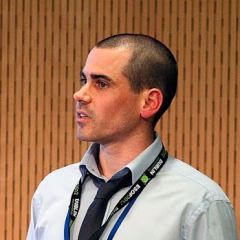AAAI Spring Symposium 2023
AITA: AI Trustworthiness Assessment
|
|
|
Keynotes
Prof. Dr. Stefan Wrobel, Fraunhofer IAISProf. Dr. Stefan Wrobel is Director of the Fraunhofer Institute for Intelligent Analysis and Information
Professor Wrobel’s work is focused on methods of Machine Learning and Artificial Intelligence, with As Speaker of the “Fraunhofer Big Data and Artificial Intelligence Alliance”, vice-speaker of the Title: Trustworthy AI - From Reliable Algorithms to Certified Systems Abstract: Almost everywhere around the world, there has long been a unanimous demand from society that deployed AI systems must be trustworthy with respect to their function and their values. With the extremely rapid and widespread adoption of general-purpose AI systems based on generative foundation models, and increasing deployment of AI systems in all sectors, this demand appears more urgent than ever. In this talk, we argue that in order to assess the state of trustworthy AI, we should firstly build on firm technical results about our algorithms and models, but must secondly equally importantly consider regulatory efforts, and thirdly move on to a systemic view that encompasses the whole of an AI system in its socioeconomic context. We discuss each of these perspectives in turn, giving examples from our own research and standardization efforts, and from application projects with industry.
Dr. Christophe Labreuche, ThalesGraduate engineer diploma from Ecole Centrale de Lyon (1993); PhD in applied mathematics from University of Paris Dauphine (1997). He has been working in more than 20 years in decision theory, and especially in multi-criteria decision making, explainable artificial intelligence, argumentation, game theory, automated negotiation, automated decision making, application to software and system engineering. His field of interest includes also the representation of uncertainty and vagueness, and the modelling of expert knowledge. He applied these techniques and especially multi-criteria approach to industrial applications in the domains of homeland security, defense, crisis management, transport and satellites. He is Senior Expert in Artificial Intelligence and is Senior Program Chair or Program Chair of the main AI conferences. He published more than 40 articles in journals and 100 publications in conferences. Title: Multi-Criteria Decision Aiding to Support Trustworthiness Assessment Abstract: Trust of AI systems is characterized by multiple dimensions: data quality, robustness, dependability, explainability among others. Each of these dimensions can be measured by several metrics. There is thus a need to aggregate all relevant metrics for a given problem in order to select an AI solution before its deployment, or to monitor an AI solution over time. Multi-Criteria Decision Aiding (MCDA) can help to construct a Trust Score from multiple metrics. After reviewing the main MCDA approaches, we will show that, as such a MCDA Trust Score is itself an AI function, one shall analyze its trustworthiness. This yields in particular the following questions. How to ensure guarantees on the outcome of the Trust Score? What kind of training data can we handle? How to explain the Trust Score? How to handle uncertainty in the input data? These questions will be illustrated on an example with several data quality metrics.
Dr. Freddy Lecue, J.P. MorganDr Freddy Lecue (PhD 2008, Habilitation 2015) is AI Research Director at J.P.Morgan in New York. He is also a research associate at Inria, in WIMMICS, Sophia Antipolis - France. Before joining J.P.Morgan he was the Chief Artificial Intelligence (AI) Scientist at CortAIx (Centre of Research & Technology in Artificial Intelligence eXpertise) @Thales in Montreal, Canada from 2019 till 2022. Before his leadership role at the new R&T lab of Thales dedicated to AI, he was AI R&D lead at Accenture Technology Labs, Dublin - Ireland. Prior joining Accenture he was a research scientist, lead investigator in large scale reasoning systems at IBM Research from 2011 to 2016 Before his AI R&D lead role, Freddy was a principal scientist and research manager in Artificial Intelligent systems, systems combining learning and reasoning capabilities, in Accenture Technology Labs, Dublin - Ireland. Before joining Accenture in January 2016, he was a research scientist and lead investigator in large scale reasoning systems at IBM Research - Ireland. Title: Explainable AI in Finance: Present and Future Challenges Abstract: Financial institutions require a deep understanding of the rationale behind critical decisions, and particularly the predictions made by machine learning models. This is particularly true in high-stake decision-making such as loan underwriting and risk management. This has a led to a growing interest in developing interpretable and explainable Artificial Intelligence (XAI) techniques for machine learning models that can provide insights into the model's decision-making progress. The development of these models will be crucial for the widespread adoption of machine learning (including deep learning) in finance and other regulated industries. This presentation will first give an overview on the recent progress of adopting and enriching XAI techniques in finance, and then review recent challenges where XAI techniques would need to be pushed further to embed the latest advancement of AI techniques including Large Language Models.
Dr. Elham Tabassi, NISTElham Tabassi is the Chief of Staff in the Information Technology Laboratory (ITL) at the National Institute of Standards and Technology (NIST). She leads NIST Trustworthy and Responsible AI program that aims to cultivate trust in the design, development, and use of AI technologies by improving measurement science, standards, and related tools in ways that enhance economic security and improve quality of life. She has been working on various machine learning and computer vision research projects with applications in biometrics evaluation and standards since she joined NIST in 1999. She is a member of the National AI Resource Research Task Force, vice-chair of OECD working party on AI Governance, a senior member of IEEE, and a fellow of Washington Academy of Sciences.
Invited speakerDr. Maximilian Poretschkin, Fraunhofer IAISDr. Maximilian Poretschkin is head of “Safe AI and AI-Certification” at the Fraunhofer Institute for Intelligent Analysis and Information Systems IAIS. In this role, Dr. Poretschkin has led a large variety of projects and AI assessments with global partners from industry and government. Particularly noteworthy is the project “CERTIFIED AI”, which develops testing principles, assessment tools and standards for AI systems and has published one of the first assessment catalogs for AI systems. In addition, Dr. Poretschkin is head of the working group "AI assessment and certification" of the German standardization roadmap AI. Stages prior to his position at Fraunhofer included a position as a consultant at the strategy consulting firm Bain & Company and a postdoctoral position at the University of Pennsylvania in Philadelphia. Dr. Maximilian Poretschkin studied physics and mathematics in Bonn and Amsterdam and received the doctoral award for the best dissertation at the University of Bonn in 2015. He is an alumnus of the German National Academic Foundation. Abstract: Artificial intelligence is penetrating more and more areas of our lives, taking on increasingly responsible activities. At the same time, it is to be expected that this technology of the future can only develop its full potential if sufficient trust can be created in its use. AI assessments (by independent parties) can be an appropriate measure of promoting this trust. Such assessments are partly required by the currently evolving regulatory landscape of AI. They can also be beneficial on a voluntary basis, for example as a basis for insuring AI systems or for establishing a strong brand. At the same time, AI systems differ greatly from classically programmed software, so that established procedures for testing software fall short of systematically proving that AI systems meet the requirements demanded of them. The talk starts with a short overview of the planned European regulation of AI systems and then presents an AI assessment catalog that was developed at Fraunhofer IAIS and addresses important challenges in the evaluation of AI systems. Finally, some practical examples of AI assessments are presented which have been carried out based on the assessment catalog. |



